
Cosmetic Regulations: labels & certifications
Today, many labels exist for cosmetic products. Who awards it? Is it really a guarantee of quality? Not all labels are created equal since the requirements of the certifying bodies are not necessarily identical. So, how do you choose the labels for your cosmetic products?
We give you a breakdown of the different labels to help you navigate your way through the market.
What are Labels & Certifications?
The label guarantees to the consumer that the product or service meet certain criterias in terms of quality, origin, and method of production.
Certification is defined by law and makes it possible to certify that the product meets standards. Certifications are issued by independent and recognised organisations.
Why a label?
- The cosmetic & care industry is concerned by many sustainable issues
- Customers want more sustainable products
- Labels are a way to build trust
- But too many exist and they are not equal
Key issues in the cosmetic & personal care sector

- Transparency & traceability: supply chains of ingredients are global and sometimes difficult to track
- Green formulations: a need of the market exists to switch to renewable sources for raw materials
- Sustainable packaging: legal constraints are rising to decrease the impact of packaging
- Climate change: the Paris Agreement requires that any industry reduces its greenhouses gases emissions
- Water management: the cosmetic industry uses a large amount of water, generating impacts & dependencies
- Social impacts: most industries focus more on the environmental side, or have a foundation and/or make a charity donation, but few create social value in their communities and for their stakeholders
US: more sustainable products wanted but a lack of trust
- 61% of all consumers rate a brand’s sustainability efforts as somewhat to very important when purchasing a beauty/wellness product
- 21% are willing to pay more
However…
- 21% don’t trust that brands are as sustainable as they claim
- 25% don’t know how to tell if a product is sustainable at all
UK: 60% want cruelty free/vegan or natural/organic products
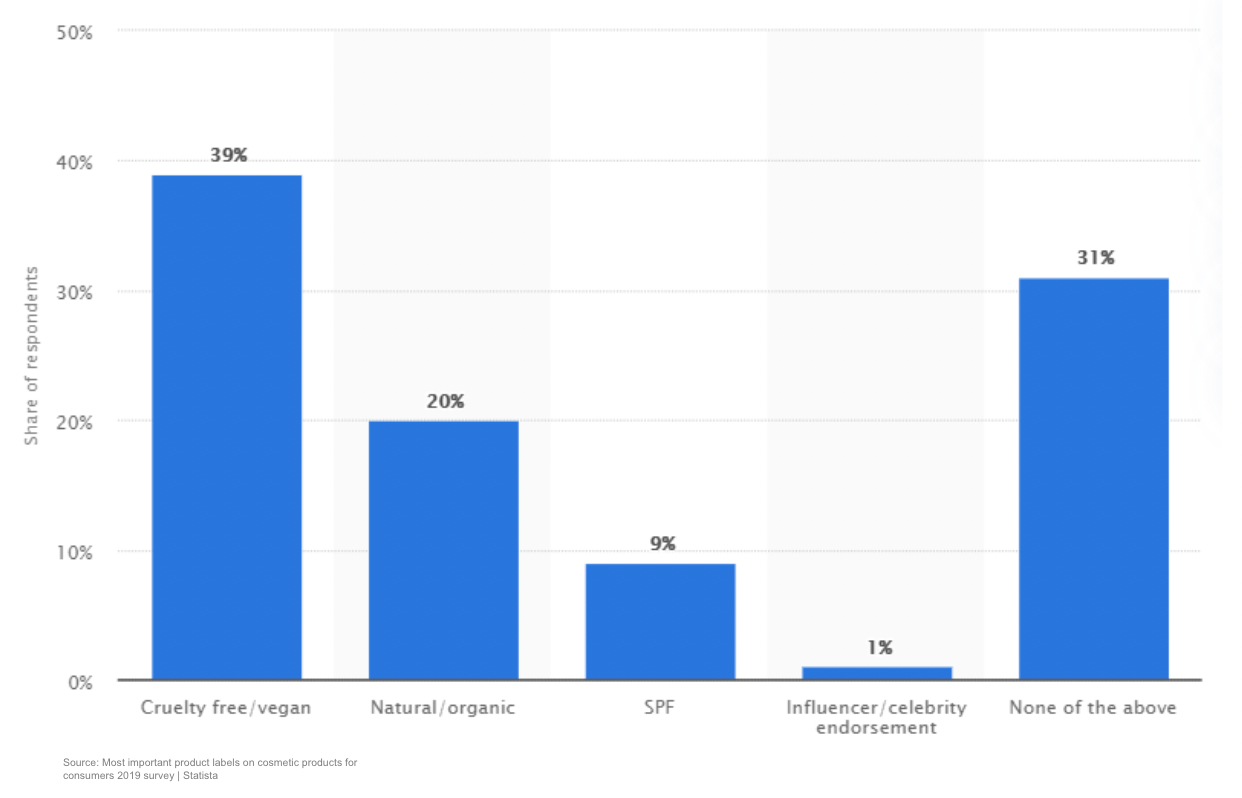
Main categories of a label:
- Natural or organic
- Environmental
- Cruelty free (not test on animals)
- Vegan
Natural or Organic
Products with labels or certifications below must be in accordance with the European COSMOS standard.
- Ecocert Greenlife (France)
- Cosmebio (France)
- BDIH (Germany)
- Icea (Italy)
- Soil Association (UK)
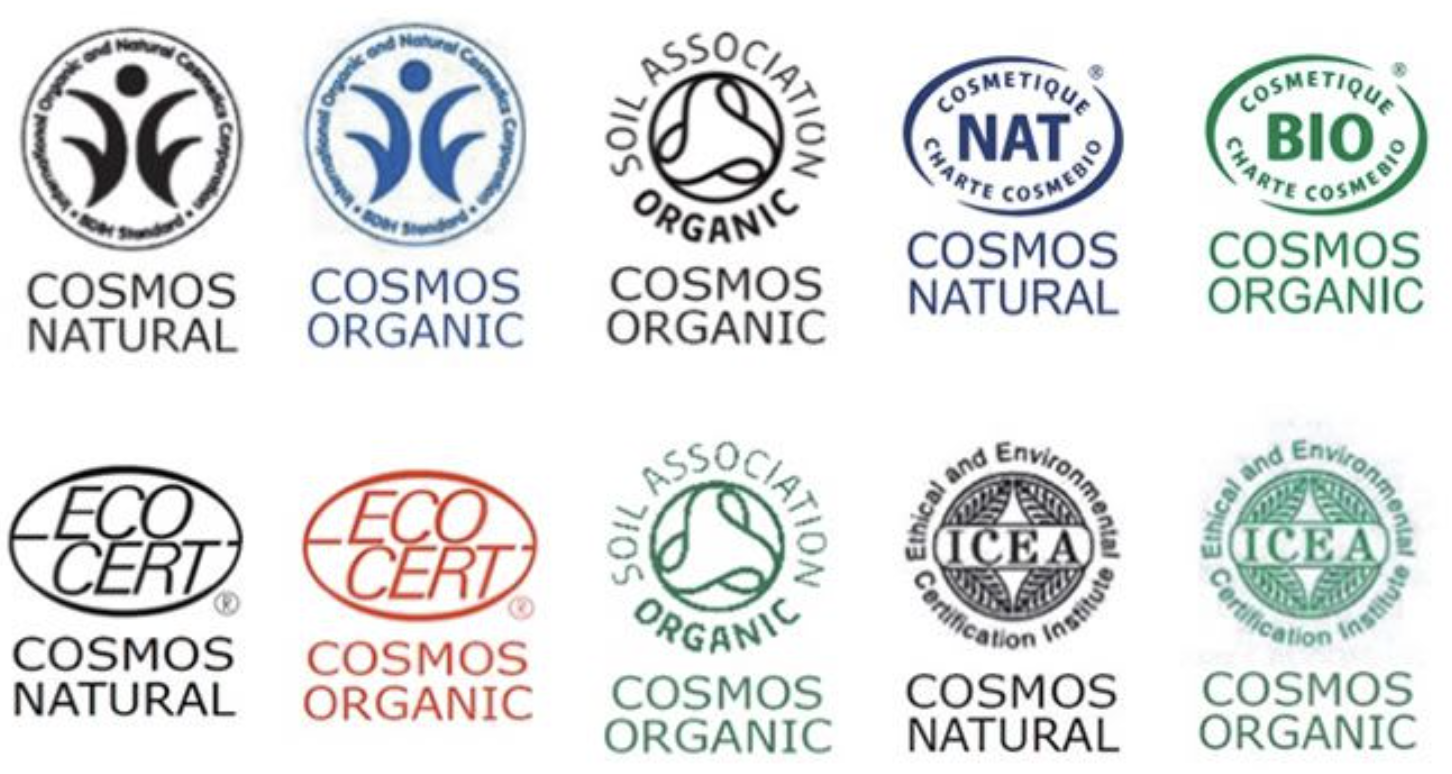
Other European organic labels:
- Nature & Progrès (France)
- Natrue (Belgium)
- Biodynamy label
- Demeter (France)
International organic labels:

Cruelty-free:

Vegan:

Environmental:
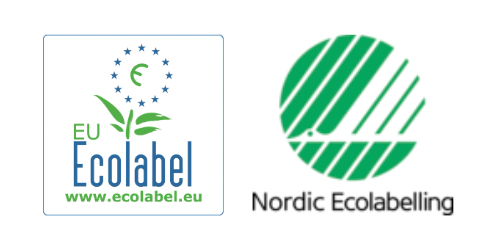
Ethical & Transparency:
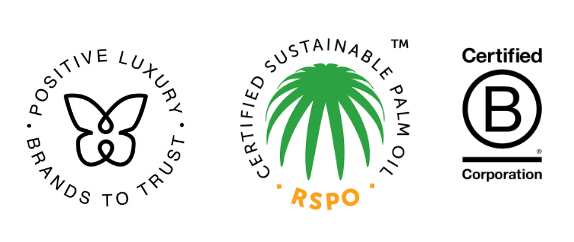
Health & Safety:
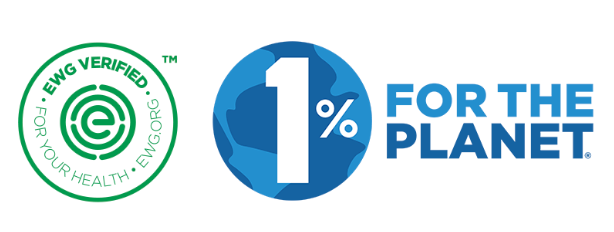
Environmental Labels

The European ecolabel : a tool for circular economy
The European Ecolabel is an official ecological label issued by public authorities.
It meets the requirements of a standard (ISO 14 024) giving it the designation of eco-label. It applies to 23 categories of products.
The specifications of the label are defined in order to decrease the main environmental impacts of products over their entire life cycle (from the extraction of raw materials, to the end of life, including manufacturing, transport and use) through the reduction of hazardous substances and biodegradability, eco-design of packaging.
This label also considers product performance and quality, health aspects and, for certain product categories, social aspects.
Products in the Hygiene & beauty category: shower gel & soap, shampoos & conditioners, shaving foam.
EWG VERIFIED : a new standard for health
EWG (Environmental Working Group) VERIFIED is said to be the “gold standard in health and wellness” and is used to show consumers which products are best for health, based on the latest science.
The EWG VERIFIED logo provides greater transparency as it encourages brands to disclose all ingredients on product labels. The “FOR YOUR HEALTH” mark on a product means that the product goes above and beyond its green ratings in EWG’s Skin Deep as brands have to reveal more information about the formulations and manufacturing processes.
Products with the stamp of approval meets EWG’s strictest standards for consumer’s health and transparency as well as uses good manufacturing practices to ensure product safety.
Products in the hygiene & beauty category: skincare, haircare, makeup, sun care, men’s products, baby products, fragrance.
B CORP: making businesses a force for good

B Lab is a “nonprofit network transforming the global economy to benefit all people, communities, and the planet”.
It measures a company’s entire social and environmental impact and businesses must meet the “highest standards of verified performance, accountability, and transparency on factors from employee benefits and charitable giving to supply chain practice and input materials”.
The criteria includes:
- Governance (corporate, social, and environmental targets)
- Workers (% of company owned by workers)
- Communities (for the under-represented)
- Environment (monitoring waste)
- Customers (impact of product on people’s lives)
Brands must demonstrate:
- A high social and environmental performance by achieving a B Impact Assessment score of 80 or above
- Make a legal commitment by changing their corporate governance structure to be accountable to all stakeholders, not just shareholders
- Exhibit transparency by allowing information about their performance measured against B Lab’s standards to be publicly available
Brands must also get re-certification every three years
Beauty Coalition a working group part of B-Corp
1% for the planet
1% for the planet is a certification company that validates any business that gives 1% of its revenue (at company level, brand level or product level) to not-for-profit environmental organisations (1% vetted environmental partners).
Businesses donate 1% of their annual sales directly to organisations in our environmental partners network.
Companies need to submit proof of annual revenue and donation receipts to 1% team each year to complete their certification.
3 level of Company Membership
- Full Company: 1% of its total annual revenue to environmental causes. Companies can use “1% for the Planet” logo across every channel and on all of their products
- Brand Level: brand level membership is for brands or companies that are owned by a larger entity. They commit to giving 1% of total annual revenue for all sales made through the brand and must provide proof of revenue for the sales of the brand. Brand level membership may also apply to multinational companies who choose to commit to giving 1% of total annual revenue for all sales made in specific countries
- Product Line: 1% of revenue from the sales of a specific product or service. Product line members must choose a product line that has at least $2.5 million US dollars in annual sales
Natural & Organic Labels

COSMOS
COSMOS – COSMetic Natural Organic Standards – is the international specification created by BDIH, Cosmébio, Ecocert, ICEA and Soil Association in order to harmonise the guarantees of organic cosmetic labels between the different countries of the world.
Since January 1, 2017, the COSMOS specifications replace the national specifications for the certification of new cosmetic products and modified products.
Transition to the COSMOS label for organic products
COSMOS label compared to ECOCERT certification & COSMEBIO label
- the content of organic ingredients out of the total ingredients of the product increases from 10 to 20% (taking into account the water contained in the bottles)
- Only biodegradable ingredients will be accepted
Ecocert Greenlife
- Minimum 95% of the ingredients are natural or derived from natural sources
- Minimum 95% of plant ingredients are produced by organic farming
- At least 10% of entire product contents (including water) must be produced by organic farming
COSMEBIO
- Same as Ecocert Organic
BDIH
- Natural source raw materials or those produced by permitted ecological processes
- Some requirement for listed plant materials to be organic
- Only certain synthetic preservatives are permitted
Soil Association
- Minimum 95% organic ingredients by weight (of the agricultural ingredients) and only permitted non-organic ingredients, processing aids and water
- Water is excluded from the organic calculation
- Products that contain 70-95% organic ingredients can be labelled with the phrase “product containing X% organic ingredients"
ICEA
- Plant/animal materials used must be organic
- Prohibited list of ingredients/chemical reactions
COSMOS criteria:
ORGANIC
- Minimum 20% organic content (except rinse off/powders 10%)
- 95% of physically processed agro ingredients must be certified organic
- Some must-organic ingredients such as sunflower oil or mint hydrosol
NATURAL
- At least 95% of the ingredients from natural origin
- Products that comply with the COSMOS-standard in all respects but do not meet the required minimum organic percentages
Positive points:
- Only biodegradable ingredients
- Only permitted chemically processed agro ingredients (CPAI)
- Nanomaterials, GMOs and Irradiation are forbidden
- Responsible use of natural resources, Production and transformation processes that respect the environment and human health
- Minimisation of the environmental impacts of packaging
Limitations:
- Not vegan: milk, honey, beeswax… allowed
- Authorised palm oil derivatives
- On the total product, up to 2% of petrochemical origin (within a list of authorised ingredients)

NATRUE
Founded in 2007, NATRUE is a Brussels-based international non-profit association committed to promoting and protecting Natural and Organic Cosmetics worldwide.
As of 01.01.2021, NATRUE's new certified finished cosmetic products will be certified either as “natural” or “organic.” only. (The older version of the label also certified “partly organic natural cosmetics” with a minimum of 70% of organic natural ingredients).
NATRUE criteria:
ORGANIC
- Minimum 95% natural ingredients must be from controlled organic cultivation and/or controlled wild collection
- At least 20% of natural substances not chemically modified
- At most 15% of transformed substances of natural origin
NATURAL
- Lists of allowed ingredients & how they can be processed
Positive points:
- No synthetic perfumes and colours
- No derivatives of petroleum products (paraffins, PEG etc)
- No silicone oils and derivatives, no GMO
- No irradiation of final product and botanical ingredients
- Products not tested on animals
Limitations:
- Authorised palm oil derivatives
- PET packaging authorised
The criteria of the NATRUE label are adapted to each type of product.
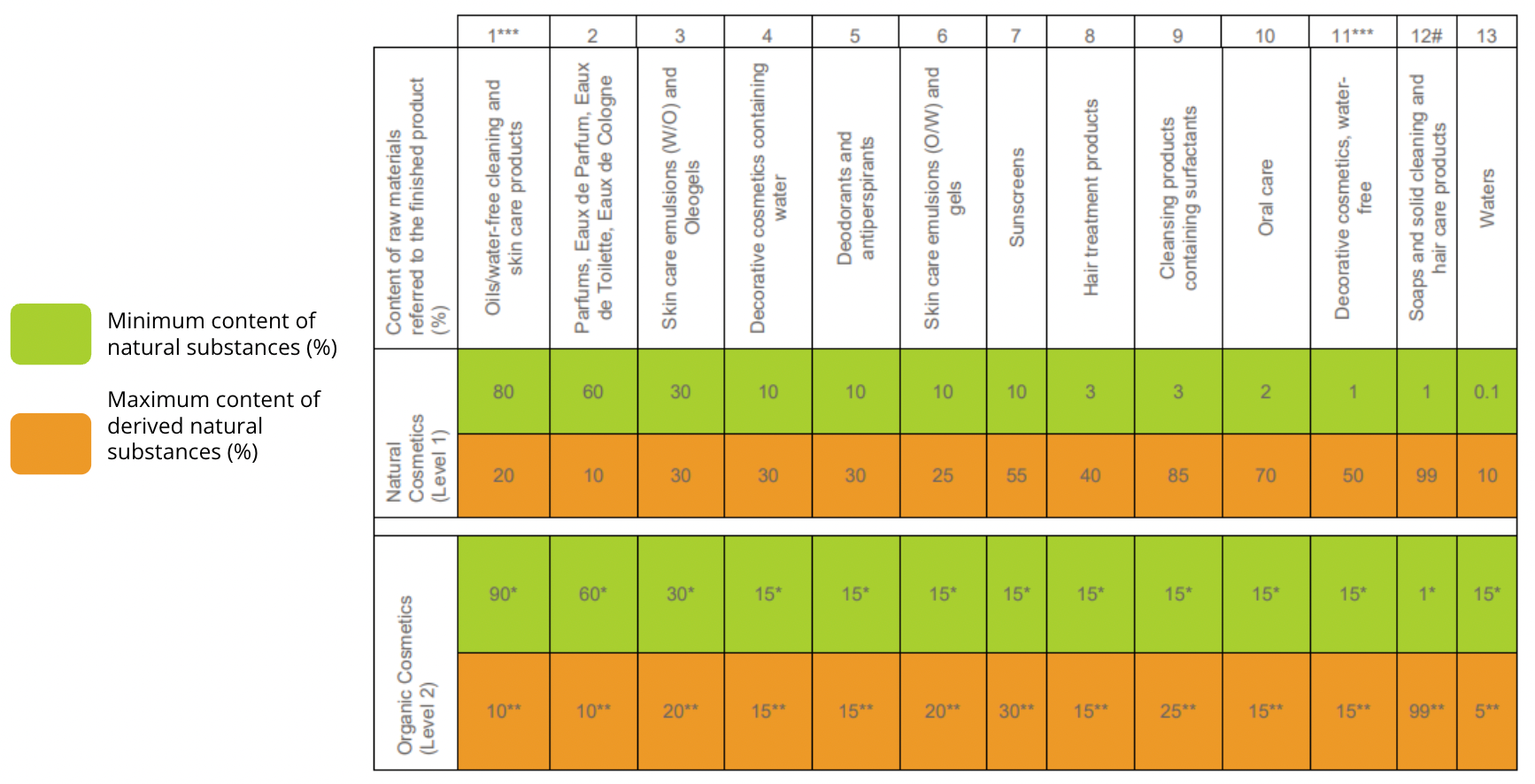
NATURE & PROGRES
Association of consumers and professionals in France - it is one of France's leading and oldest organic farming organisations.
Positive points:
Very strict requirements
- Petrochemical and synthetic ingredients (with rare exceptions), GMOs, palm oil, etc. prohibited
- The manufacturing processes must be mechanical or result from simple chemical and physical processes
- Environmental requirements on the production process & packaging
Limitations:
- Not vegan: milk, honey, beeswax, eggs allowed
- Three synthetic preservatives allowed
DEMETER
The Demeter label applies to production and processing, with specifications specific to biodynamics, in addition to organic certification.
Positive points:
- Synthetic perfumes and dyes, petrochemicals and sodium laureth sulfate prohibited
- Ingredients derived from petroleum, nanoparticles prohibited
- Water is not counted in the percentage of natural ingredients
- Plastics with chlorine (PVC) prohibited
- The product's impact on the environment is also reduced at all stages: production, packaging, waste water
Limitations:
- Not vegan
- No minimum required in organic or Demeter ingredients to be labeled
The USDA Organic Seal
The National Organic Programme (NOP) is the federal regulatory framework governing organic food. It is administered by USDA.
Unlike organic foods and beverages, USDA has not created specific organic standards for formulating and labelling personal care products that contain organic ingredients.
Eligibility of the personal care product:
- contains or is made up of agricultural ingredients
- can meet the USDA/NOP organic production, handling, processing and labeling standards
Further, the operations which produce the organic agricultural ingredients, the handlers of these agricultural ingredients, and the manufacturer of the final product must all be certified by a USDA-accredited organic certifying agent.
Prohibition of:
- GMOs, ingredients derived from petroleum prohibited
- ionising radiation
- processing of agricultural products
- formaldehyde releasers
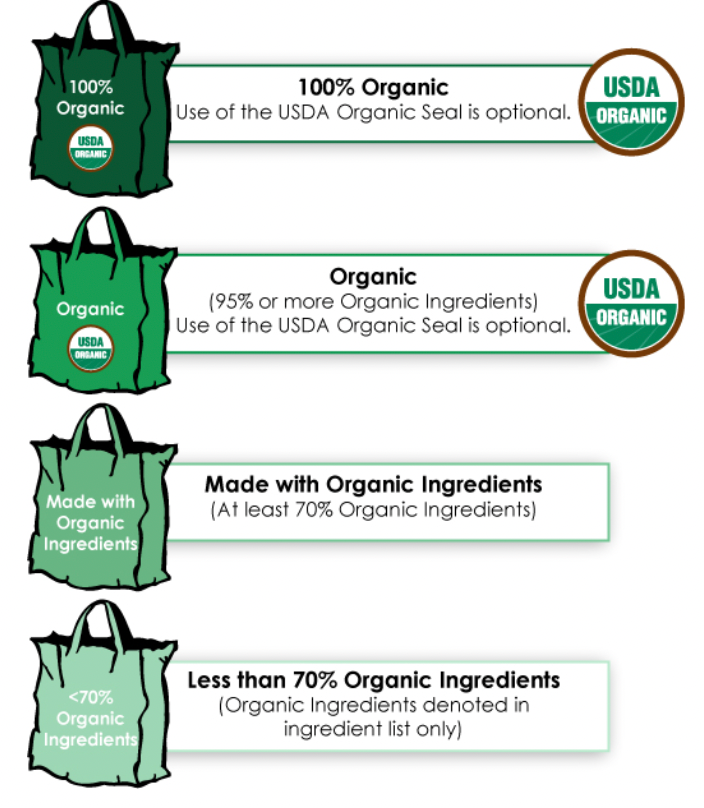
NSF/ANSI 305 is the only American National Standard that defines labelling and marketing requirements for personal care products containing organic ingredients.
Criteria:
- The standard allows using the “contains organic ingredients” designation for products that contain at least 70% organic ingredients by weight
- The standard also allows for limited chemical processing needed to manufacture personal care products, which would not meet the USDA National Organic Program (NOP) requirements for organic food products
Categories: products intended for external use on any part of the body, such as cosmetics, oral care products, moisturisers, lotions, soaps, shower gels and bath beads.
Other Certifications
Certech
In Canada, the certification of natural and organic products uses the IOS Cosmetics standard established by Certech, a private company.
- Natural products: A minimum of 95% of the ingredients must be of natural origin
- Organic products: must also use certified organic ingredients
- Must be substantially free of synthetic ingredients, and must not contain pesticides, harmful preservatives, artificial colours and fragrances (IOS Cosmetics Standard 2008)
- Packaging must be recyclable
- Products and their individual ingredients must not be tested on animals
Australian Certified Organic Standard
The Australian Certified Organic Standard is the rule book for businesses that are certified organic with Australian Organic’s certifying arm, Australian Certified Organic.
As one of the strictest standards in Australia, the Australian Certified Organic Standard brings together the requirements of national and international relevant standards.
Cruelty-Free & Vegan Labels

Legal Context
Animal testing is only banned in India, the United Kingdom, and the European Union.
In the European Union, it is forbidden to claim compliance with a regulation when putting a product on the market, as it is mandatory to do so. "Not tested on animals" is an example of a forbidden claim; (the Regulation (EC) n°655/2013, first criteria).
China is still one of the biggest countries that do mandatory animal testing on cosmetics sold in their country. But in January 1st 2021, China finally remove it for imported “ordinary” cosmetics sold in China: imported shampoo, blusher, mascara, and perfume will no longer have to be animal tested for eye and skin irritation in Chinese laboratories.
Cruelty-free and vegan labels focus on the animal conditions.
They control:
- the absence of tests on animals for products & ingredients
- the absence of products sold on markets where animal tests are still used
For vegan labels: they also control that there is no ingredient of animal origin.
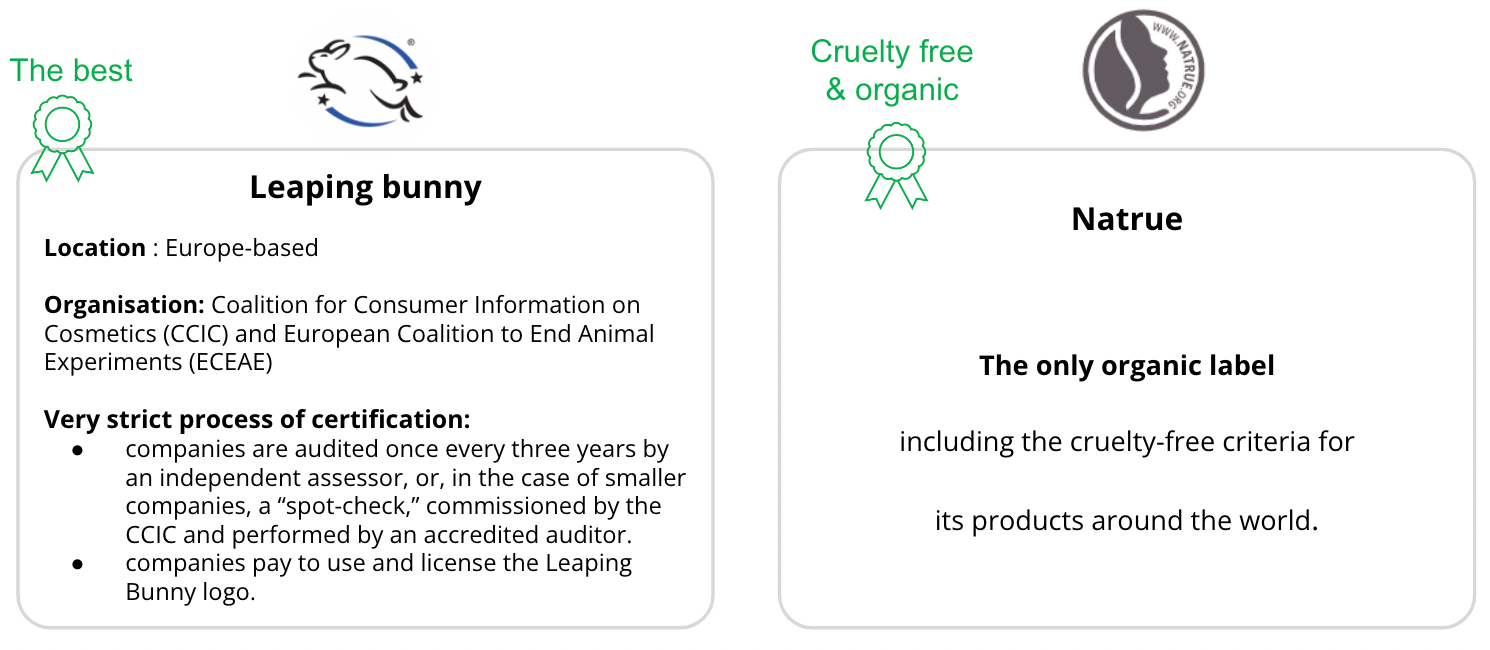
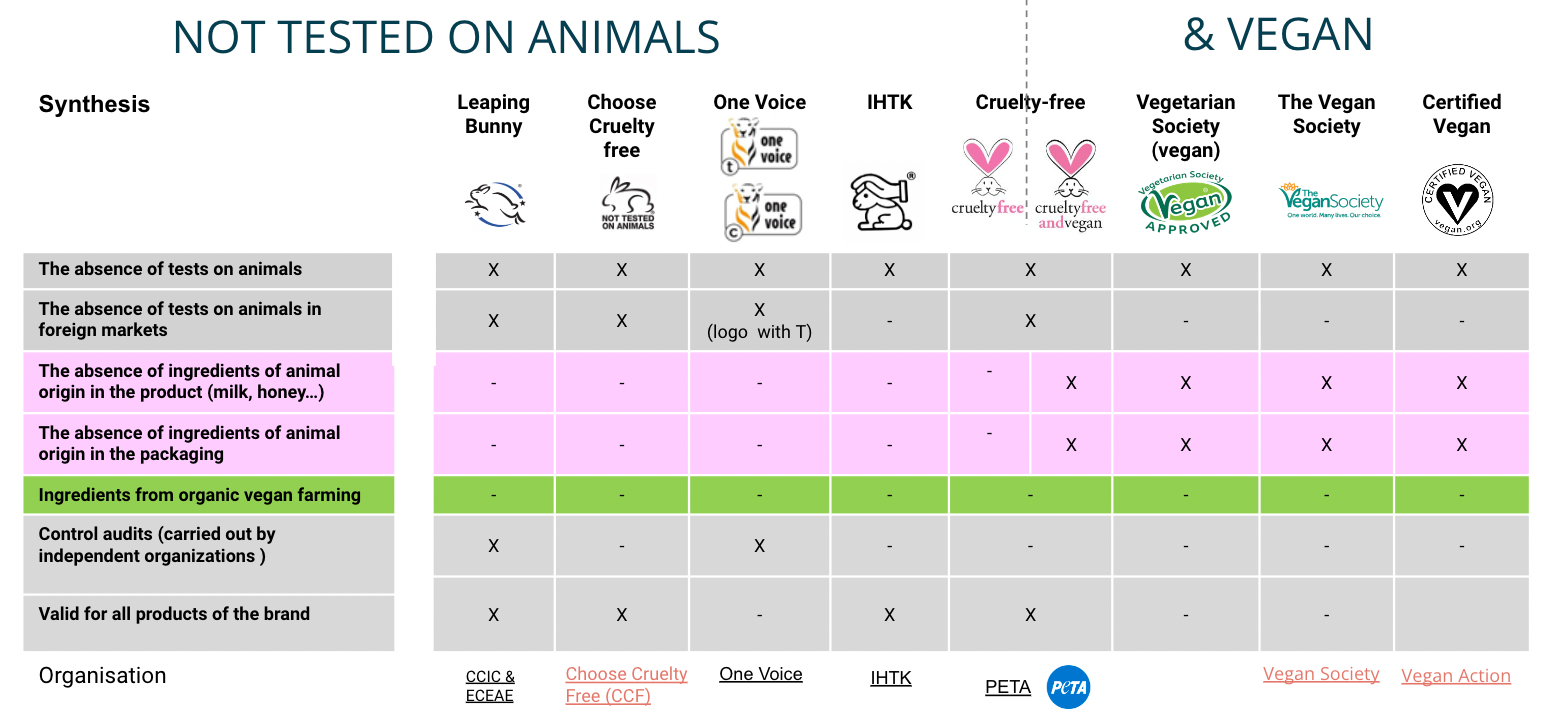
Appendix
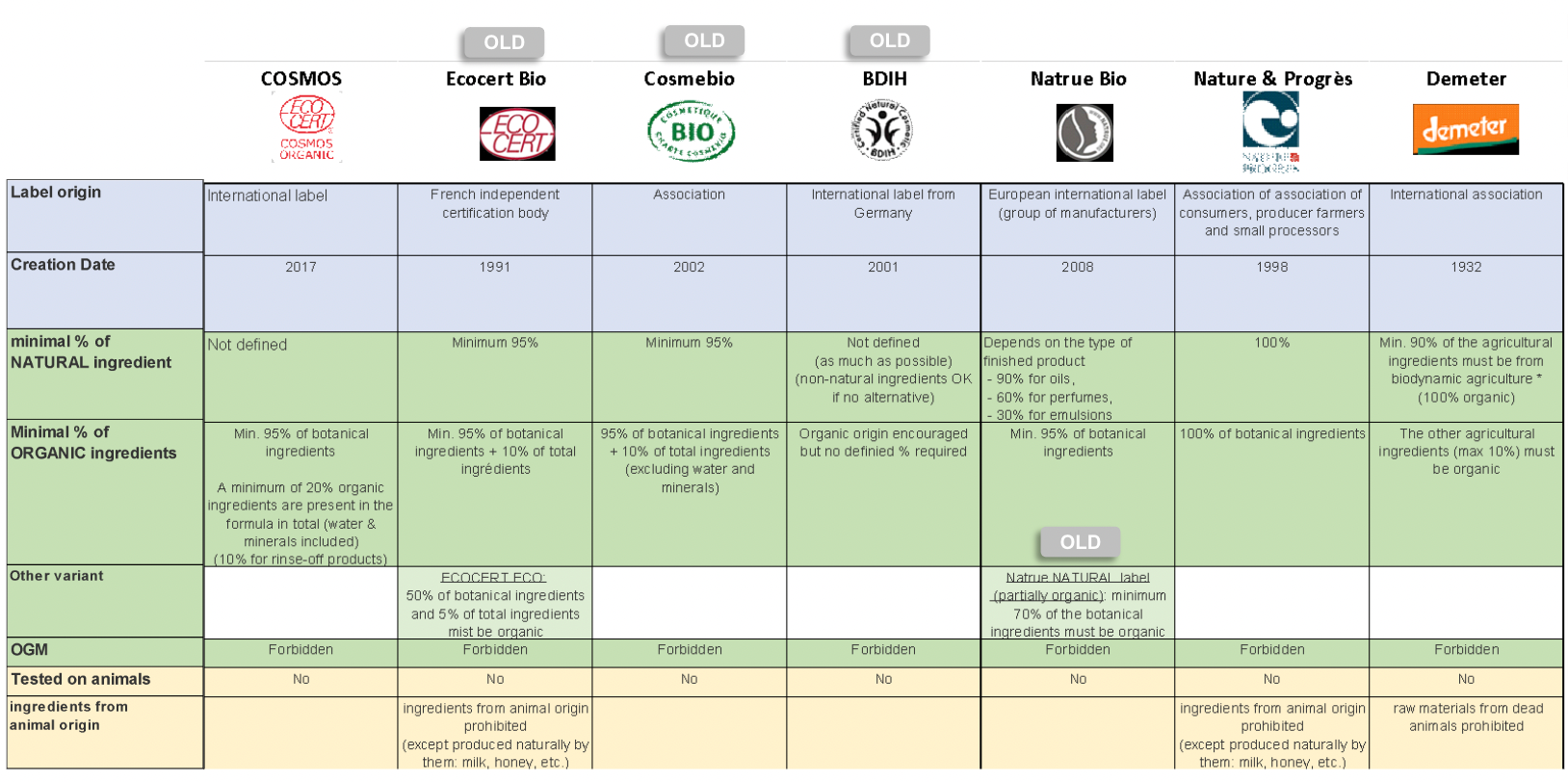
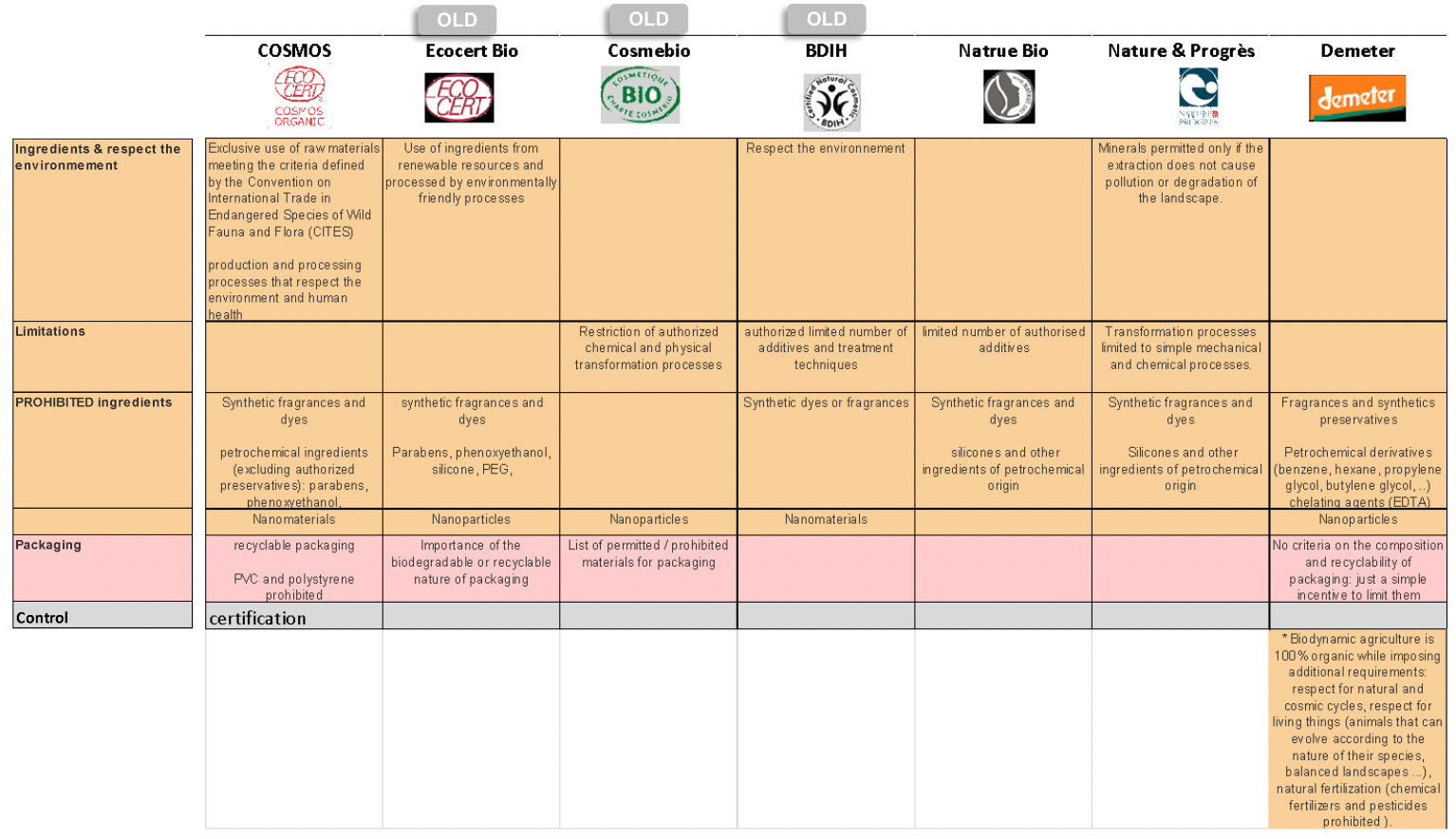
Sources:
- Labels Environnementaux | Particuliers | Agir pour la transition écologique | ADEME
- https://www.mondebio.com/cosmetiques_bio.php
- https://www.labelinfo.be/fr/tableaux-comparatifs
- http://www.vedura.fr/guide/ecolabel/cosmetique
- Les différents labels bio cosmétique (leshappycuriennes.com)
- https://thetrustsociety.fr/blogs/la-vie-en-jaune/differents-labels-cosm%C3%A9tique-bio-cosmos-cosmebio-ecocert-meilleur-france
- https://librairie.ademe.fr/consommer-autrement/4003-hygiene-et-beaute-impacts-environnementaux-et-labels.html
- Petit guide des labels et certifications cosmétiques (supercoop.fr)

